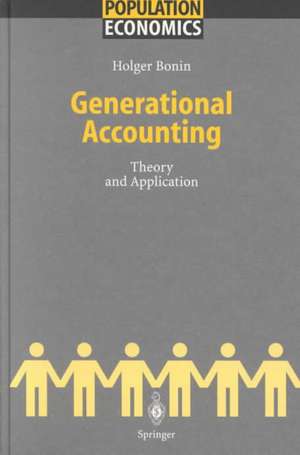Generational Accounting: Theory and Application: Population Economics
Autor Holger Boninen Limba Engleză Hardback – 28 aug 2001
| Toate formatele și edițiile | Preț | Express |
|---|---|---|
| Paperback (1) | 943.73 lei 6-8 săpt. | |
| Springer Berlin, Heidelberg – 6 dec 2010 | 943.73 lei 6-8 săpt. | |
| Hardback (1) | 950.03 lei 6-8 săpt. | |
| Springer Berlin, Heidelberg – 28 aug 2001 | 950.03 lei 6-8 săpt. |
Din seria Population Economics
-
 Preț: 422.11 lei
Preț: 422.11 lei - 15%
 Preț: 647.59 lei
Preț: 647.59 lei - 18%
 Preț: 954.45 lei
Preț: 954.45 lei - 15%
 Preț: 641.71 lei
Preț: 641.71 lei - 18%
 Preț: 952.40 lei
Preț: 952.40 lei -
 Preț: 395.85 lei
Preț: 395.85 lei - 15%
 Preț: 635.47 lei
Preț: 635.47 lei - 15%
 Preț: 637.59 lei
Preț: 637.59 lei - 15%
 Preț: 649.39 lei
Preț: 649.39 lei -
 Preț: 384.31 lei
Preț: 384.31 lei - 15%
 Preț: 653.65 lei
Preț: 653.65 lei -
 Preț: 391.79 lei
Preț: 391.79 lei - 15%
 Preț: 641.85 lei
Preț: 641.85 lei - 15%
 Preț: 698.15 lei
Preț: 698.15 lei - 18%
 Preț: 785.24 lei
Preț: 785.24 lei - 18%
 Preț: 950.52 lei
Preț: 950.52 lei - 15%
 Preț: 637.59 lei
Preț: 637.59 lei
Preț: 950.03 lei
Preț vechi: 1158.57 lei
-18% Nou
Puncte Express: 1425
Preț estimativ în valută:
181.78€ • 190.31$ • 150.42£
181.78€ • 190.31$ • 150.42£
Carte tipărită la comandă
Livrare economică 05-19 aprilie
Preluare comenzi: 021 569.72.76
Specificații
ISBN-13: 9783540422662
ISBN-10: 3540422668
Pagini: 284
Ilustrații: X, 268 p.
Dimensiuni: 155 x 235 x 21 mm
Greutate: 0.58 kg
Ediția:2001
Editura: Springer Berlin, Heidelberg
Colecția Springer
Seria Population Economics
Locul publicării:Berlin, Heidelberg, Germany
ISBN-10: 3540422668
Pagini: 284
Ilustrații: X, 268 p.
Dimensiuni: 155 x 235 x 21 mm
Greutate: 0.58 kg
Ediția:2001
Editura: Springer Berlin, Heidelberg
Colecția Springer
Seria Population Economics
Locul publicării:Berlin, Heidelberg, Germany
Public țintă
ResearchCuprins
1. The Rationale for Generational Accounting.- 2. Net Taxes of Living Generations.- 3. The Intertemporal Public Budget.- 4. Assessing Fiscal Imbalance.- 5. The Intertemporal State of German Public Finances.- 6. Immigration Policy and Fiscal Sustainability.- 7. Options for Social Security Reform.- 8. Whither Generational Accounting?.- A. Appendix: Proofs.- A.1 Separability of Generational Accounts.- A.2 Invariance of the Relative Fiscal Imbalance.- A.3 Normal Reaction of Future Generational Accounts.- B. Appendix: The Demographic Model.- C. Appendix: German Public Sector Budgets.- References.
Caracteristici
Includes supplementary material: sn.pub/extras

















